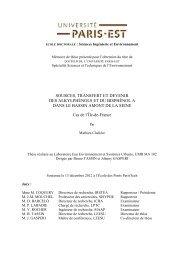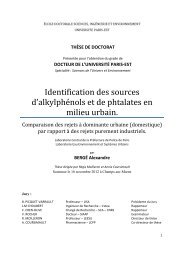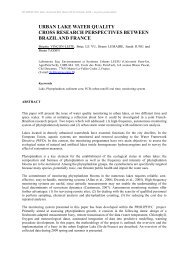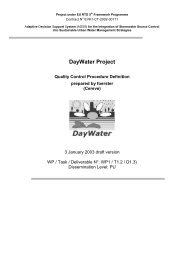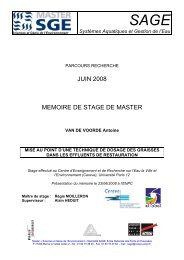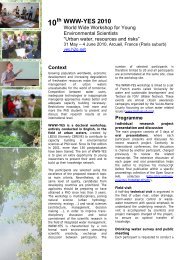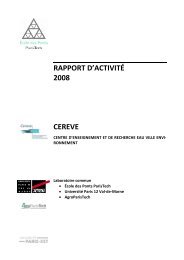View - ResearchGate
View - ResearchGate
View - ResearchGate
Create successful ePaper yourself
Turn your PDF publications into a flip-book with our unique Google optimized e-Paper software.
13 Decentralized cooperation and management ofurban services in southern countries: anapplication on water supply services in Senegal.Arona CisséINTRODUCTIONPhD Student, LEREPS *Université Toulouse 1Manufacture des Tabacs - 21, Allée de Brienne – 31042 ToulouseEmail : aronacisse@gmail.comAbstractDrinkable water crisis is since the seventies a concern shared worldwide, especially indeveloping countries urban areas.Since the early eighties, international organisations and non-governmentalorganisations (NGO) are leading several initiatives trying to solve the problem withinframeworks involving central states (between developed and developing countries),and by the early 90’ between local authorities in the framework of decentralizedcooperation.The goal of this paper is to show that public-private partnerships model involved bythe World Bank and the IMF in developing countries have shown their limits in urbanservices management, drinkable water particularly. We assume that an alternativemodel based on decentralized cooperation and a strengthening of local authoritiescapabilities may widen quality water access in low prices, especially for poor citizens.Our analysis will be organized around institutional economics and collective actiontheories in order to analyse socio-economics dynamics in drinkable water issues fordeveloping countries.Keywords:Urban services, drinkable water policies, decentralized cooperationThis thesis work follows our master’s dissertation in which we analysed ten years of publicprivatepartnership in urban water management in Senegal. We shown that even if theefficiency’s goal was attempt, social and spatial discrimination increased during this period. Inthis frame our interrogation was how authorities can improve water access for poor peopleliving in poor parts (not always illegally) of developing countries cities? Therefore,decentralized cooperation and its proximity-based model interested us as a new way toreinforce solidarities and knowledge transfers as stated in 3 rd World Water Forum in Kyoto.Since the late 70's the issue of urban planning and services access in developing countries is atthe heart preoccupations of various agencies and actors at diversified levels of interventionsfrom national to the international area.* Laboratoire d'Etudes et de Recherche sur l'Economie, la politique et les Systèmes SociauxToday, the issue continues to interest political and theoretical debates because cities indeveloping countries records most raised demographic rates in the world (today’s tendenciesare around 4% per year). Because of their high population growth these countries are facinginstitutional and material difficulties to assure access to urban services to the people, drinkablewater 48 especially. According UNDP projections, by the year 2020 more than the half ofAfrican population will live in urban areas, and authorities will face growing problems ifnothing is done.According to some authors (Jaglin & Dubresson 1993; Jaglin 2004; Dubresson 2004) problemsthat faces cities in developing countries can be understood under two ways: demographicpressure, due to both natural growth rate and the phenomenon of rural population exodus tocities on one hand, on the other to the urban territories sprawling as a result of populationgrowth which that the size of the African cities does not stop increasing.These phenomena coupled with the lack of regulatory authorities in these areas often located insuburb facilitate for us, the disorganization of urban space and network services in developingcountries.To face the issue of network services access in developing countries, drinkable water andsanitation in particular, several programmes were thought by countries and internationalorganizations. In the early 80's, an ambitious programme (International Drinking WaterSupply and Sanitation Decade) involving states and several international organizations(governmental and non governmental) tried to ensure access to water “for all” by the year1990. However, the results of this vast programme have not been commensurate with theinvestments made, what some authors (Breuil, 2004) attribute to a bad coordination betweenthe evolution of structures and institutional reform within the framework of this project andthose who follow.By the early 90s, the speech of international organization is going to change; the objective isnot any more to assure the access to water for all, but trying to insure access for the largestnumber (Baron, 2006). This situation constitutes according to us a backing on behalf of statesand international organizations in front of the scale of the problem.The failure of the drinking water and sanitation decade goals’ and the disappointment ofdeveloping countries national government, subjected to rigorous structural adjustmentprogrammes 49 , changed urban policies in developing countries.Since the 90s, Bretton-Woods institutions (IMF and World bank) and other partners ofdeveloping countries focused their speeches around decentralization. It’s in this context thatwill be launched in 1992, the Municipal Development Programme between the developingcountries and donor organizations. This new strategy oriented towards decentralization is seenby some (Stern, 1991) as a way to find new financial resources and a more efficient scale ofintervention after the depletion of previous strategies.48 Access to drinkable water is characterized by domestic connection to the network or modes of collectivesupplies (standpipes or other water sources) available on a reasonable distance from home, estimated at 200meters (Jaglin, 2001).49 Period of budgetary austerity imposed on developing countries by the Bretton Woods institutions to"consolidate public finances and bring fiscal stability in highly indebted states. Some authors These programmesare institutional process resulting from the adoption of economic and financial agreements by developingcountries with Bretton-Woods institutions. Developing countries accept reforms programme in exchange offinancial assistance...WWW-YES 2008, Paris 13 – 16 May 2008 111WWW-YES 2008, Paris 13 – 16 May 2008 112


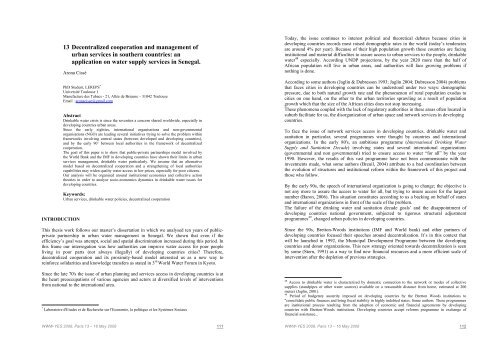
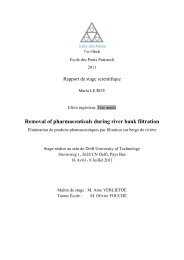
![[pastel-00730831, v1] Incidence des pratiques d'entretien ... - LEESU](https://img.yumpu.com/50938896/1/184x260/pastel-00730831-v1-incidence-des-pratiques-dentretien-leesu.jpg?quality=85)
